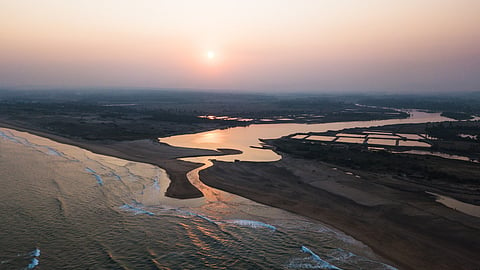
- Destinations
- Experiences
- Stay
- What's new
- Celebrating People
- Responsible Tourism
- CampaignsCampaigns
- SubscribeSubscribe
- Buy Now

Located along the northeastern coastline of Andhra Pradesh in the Srikakulam district, the quiet village of Baruva has long remained a secret known only to off-the-grid travellers, history lovers, and a few intrepid beachgoers. But change is on the horizon. With the recent visit of Union Minister of Civil Aviation K. Rammohan Naidu and a slew of announcements made during the Baruva Beach Festival, this quaint fishing village is being reimagined as a major tourism destination.
Baruva may look like just another fishing hamlet at first glance, but a deeper dive—quite literally—reveals stories from a forgotten era. Just off its coast lies the shipwreck of SS Chilka, a British-era steamship that sank in 1917 under tragic circumstances. Reportedly discovered by scuba divers in 2020, the wreckage is a poignant reminder of the region's maritime significance during World War I.
The SS Chilka, operated by the British India Steam Navigation Company, was en route to Rangoon (now Yangon, a city in Myanmar) when a devastating fire reportedly caused it to sink, leading to the deaths of around 80 people out of the 1,600 passengers on board. For decades, this ship lay forgotten beneath the waves—until now. Plans are afoot to open the site to scuba diving enthusiasts, offering an adrenaline rush and a brush with colonial maritime history.
At the heart of this transformation lies Baruva Beach. Unlike commercialised beaches, Baruva’s shoreline remains largely untouched. Here, you won’t find water scooters or crowds—but long walks, quiet sunsets, and fishermen returning with the day’s catch.
The beach is also home to a picturesque lighthouse and a small harbour, which evoke a nostalgic sense of place. Recent government announcements hint at eco-tourism projects, upgraded facilities, and community-based tourism initiatives that aim to preserve Baruva’s soul while providing new livelihood opportunities for locals.
Baruva’s charm is not just coastal—it’s cultural too. The region has several ancient temples, including the Janardhana Swamy Temple, which sees local devotees year-round. The village’s proximity to Sompeta, known for its lush green backwaters and coconut groves, offers travellers an extended itinerary of natural beauty.
For birdwatchers and nature lovers, a short drive from Baruva takes you to Telineelapuram, a lesser-known bird sanctuary where migratory birds from Siberia arrive between October and March.
The recently concluded Baruva Beach Festival brought a wave of celebration to the village, with music, food stalls, cultural performances, and traditional crafts on display. It was here that Minister Rammohan Naidu laid a roadmap for developing the region into a full-fledged tourism hub. This includes improved road connectivity, beachfront amenities, homestay development, and eco-friendly adventure tourism projects.
Stay Options: While accommodation options in Baruva are currently limited to basic lodges and homestays, plans are underway to develop boutique stays and eco-resorts. For now, travellers can base themselves in Tekkali or Palasa, both of which offer modest hotels and easy access to Baruva.
Getting There: Baruva is located about 108 km (via road) from Srikakulam, the nearest city to the village. For those coming from Vizag, the central city with an airport and railway station, you can drive via NH-16 or take a train to Sompeta, about 8-9 km from Baruva.
(With inputs from multiple sources)
